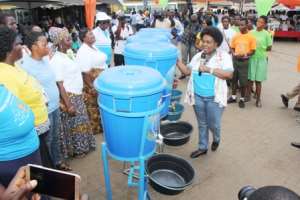
The Ministry of Sanitation and Water Resources in collaboration with the Community Water and Sanitation Agency (CWSA), has commemorated the Global Hand Washing Day with the Greater Accra Markets Association (GAMA) in Accra.
The commemoration on the theme, 'Clean hands, a recipe for health', was to promote hand washing with clean water and soap to reduce preventable diseases such as cholera, which is associated with improper hygiene and hand washing.
The programme entailed delivering of speeches from the Sector and other stakeholders as well as a drama demonstration by members of GAMA on the need to maintain proper hygiene and practise good hand washing before touching food stuff.
Madam Cecilia Abena Dapaah, the Minister of the Sector, delivering a keynote address, said the focus on the theme, was hand washing and handling of food, including food hygiene and nutrition.
he said the contamination of food items with faecal matter could easily occur if one did not develop the habit of automatic hand washing with soap and water, adding that poor hygiene was also linked to wasting and severe acute malnutrition.
She disclosed that available research had shown that children with diarrhoea do not only eat less but were less able to absorb nutrients from food, because the body became too busy fighting off diseases.
Madam Dapaah noted that food borne illnesses were major causes of death particularly among children under five years, adding that up to 70 per cent of cases of diarrhoea maybe associated with poor food hygiene.
She emphasised that the negative effect of under nutrition due to poor food hygiene during the first 1,000 days of physical growth immune system and brain development may be irreversible.
The Minister said human hands were principal carriers causing pathogens from person to person either through direct contact or indirectly through surfaces and proper hand washing with soap helped to remove germs from them by preventing transmission of respiratory infections and diarrheal diseases including cholera.
She encouraged the public to provide hand washing facilities in their homes and urged school authorities to imbibe into students' good hand washing practices by providing hand washing facilities including clean water and soap.
Madam Dapaah said: 'The power to save the lives of millions is in our hands. I wish to appeal to everyone in this market and the country at large to make hand-washing with soap a top priority in their daily activities and provide a better future for the present and subsequent generations.
'I, therefore, direct Metropolitan, Municipal and District Assemblies to henceforth take sanitation issues seriously and wage a war against mice at our various markets in the country'.
Mr Worlanyo Kwadjo Siabi, the Chief Executive Officer of CWSA, said in 2003, a monitoring and evaluation baseline carried out by Research International, a market research organisation recorded that 'only 2.7 per cent and 6.2 per cent' of mothers and children respectively were observed to wash their hands with soap at critical times, for instance after visiting the toilet.
He said the results provided a justification for CWSA to intensify the campaign for hand washing with soap.
Mr Siabi said CWSA had effectively coordinated the Global Hand washing Day Celebration for 10 years since its inception in 2008, and its award winning advert 'hohoro wonsa' created a national visibility and awareness on hand washing with soap.
He said currently there was a high awareness on proper hand washing however, the practice had increased only about 30 per cent, and had been transforming hand washing with soap from an abstract good idea into an automatic behaviour change with focus on practice.
Mr Mohammed Adjei Sowah, Chief Executive of the Accra Metropolitan Assembly (AMA) urged the public to collaborate in ensuring that the President's vision of making Accra the neatest city in Africa a feasibility adding that, it was a collective responsibility.
He said Accra at a point was declared the seventh dirtiest country in the world because of how citizens disposed off their faecal matter.
He said in 2015, Accra recorded over 20,000 cases of cholera and over 200 sufferers died from it.
Mr Sowah noted that the Minister had commissioned 24 toilet facilities for 24 schools in Accra including changing rooms for the female students.
He said for 2017/18, there had been no record of a single case of cholera in Accra because the sensitisation measures were improved.
He said the AMA would meet all market leaders to deliberate on how to ban selling foodstuff on the bare floor.




 Critics fear Togo reforms leave little room for change in election
Critics fear Togo reforms leave little room for change in election
 Flooding: Obey weather warnings – NADMO to general public
Flooding: Obey weather warnings – NADMO to general public
 Fire in NDC over boycott of Ejisu by-election
Fire in NDC over boycott of Ejisu by-election
 NDC to outdoor Prof Jane Naana Opoku-Agyemang as running mate today
NDC to outdoor Prof Jane Naana Opoku-Agyemang as running mate today
 Ejisu: CPP seeks injunction to stop April 30 by-election
Ejisu: CPP seeks injunction to stop April 30 by-election
 Dismiss ECG, GWCL, GACL bosses over losses – United Voices for Change tells gov’...
Dismiss ECG, GWCL, GACL bosses over losses – United Voices for Change tells gov’...
 Submit 2023 audited financial statements by May – Akufo-Addo order SOEs
Submit 2023 audited financial statements by May – Akufo-Addo order SOEs
 Current power outages purely due to mismanagement – Minority
Current power outages purely due to mismanagement – Minority
 ECG hoists red flag to fight Ashanti Regional Minister over arrest of General Ma...
ECG hoists red flag to fight Ashanti Regional Minister over arrest of General Ma...
 Mahama’s 24hr economy will help stabilise the cedi; it’s the best sellable polic...
Mahama’s 24hr economy will help stabilise the cedi; it’s the best sellable polic...
